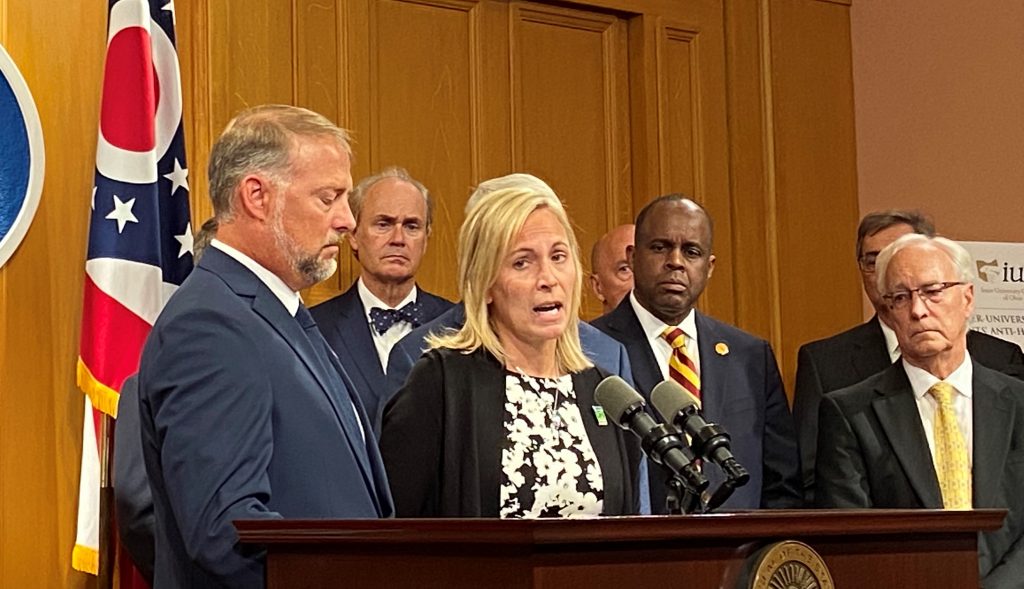News

The Statehouse News Bureau reviews the bills Ohio lawmakers passed this year
< < Back toCOLUMBUS, Ohio (Statehouse News Bureau) — Ohioans still won’t be allowed to legally shoot off fireworks this New Year’s Eve but thanks to a new law passed this year, they will be able to do that when the Fourth of July rolls around. And that’s not all. There are many new laws on the books this year.
The most controversial law put in place this year limits the governor’s ability to issue health orders, like a statewide curfew or mask mandate. Republican Ohio lawmakers voted in March to strip Gov. Mike DeWine of much of his power to deal with COVID. Republican Sen. Kristina Roegner (R-Hudson) says the bill, which gives power to a legislative committee to oversee emergency situations and allows lawmakers to overrule the governor’s future health orders, is needed.
“This restores the voice of the people. It restores the balance of power and it restores our liberties,” Roegner said.
Democrats, including Sen. Nickie Antonio (D-Lakewood) objected.
“To have a response to an emergency conducted by committee, I don’t believe it’s the right way for us to deal with emergencies going forward, especially health emergencies,” Antonio said.
DeWine agreed on that point and vetoed the bill. But the legislature overrode that veto and the bill became law in June. Since then, there have been more than 7,200 deaths in Ohio because of COVID.

Later, in the year, when COVID was posing a threat as students started back to school, DeWine said he was helpless to issue a statewide mask mandate like he had done earlier in the pandemic.
“There is not the appetite in this state today for that kind of mandate,” DeWine said.
There was an appetite in the legislature to require high school graduates to have a financial literacy course, and it passed with bipartisan support. So did a law that changes testing to be more in line with the SAT and ACT testing that college-bound students currently take.
When Ohio voters go to the polls next fall, they’ll no longer have to research which party Supreme Court candidates, who are supposed to be non-partisan, represent. Lawmakers passed a bill that will put an R or D on the ballot beside their names, over objections from Democrats such as Rep. Stephanie Howse (D-Cleveland), who noted justices from her party won three seats on the state’s highest court in the last two elections.
“So let’s just be real. Be a straight shooter. Y’all scared. It’s cool. Because Democrats are absolutely coming for the Ohio Supreme Court in ’22,” Howse said.

“We believe this is the right policy. We can have differences of opinion on that. But I think questioning motives is way out of line,” Stewart said.
Ohio lawmakers passed a bill that makes sure fraternities and sororities on college campuses don’t get out of line when it comes to hazing. “Collin’s Law” is named after Kathleen Wiant’s son, who died after a hazing incident at Ohio University in 2018.
“For the last weeks of Collin’s life, he had endured extreme hazing. He was beaten, belted, waterboarded, and forced drugs,” Kathleen Wiant said.
Cory and Shari Foltz, parents of Stone Foltz, who died after a 2019 hazing incident at Bowling Green State University also lended their support for the bill.

“They are snakes. They do not want to have an honest debate or conversation with the public. What they are hellbent on doing is preventing Ohioans from accessing abortion care by any means necessary,” Copeland said.
Lawmakers also passed COVID relief bills, including one that allocated federal COVID money to pay off the debt in the state’s unemployment system. And after many years of debate, they changed Ohio’s fireworks laws so those explosives that you could purchase in Ohio before no longer had to be taken out of state for detonation on specific holidays – starting halfway through 2022.
9(MDU1ODUxOTA3MDE2MDQwNjY2NjEyM2Q3ZA000))

